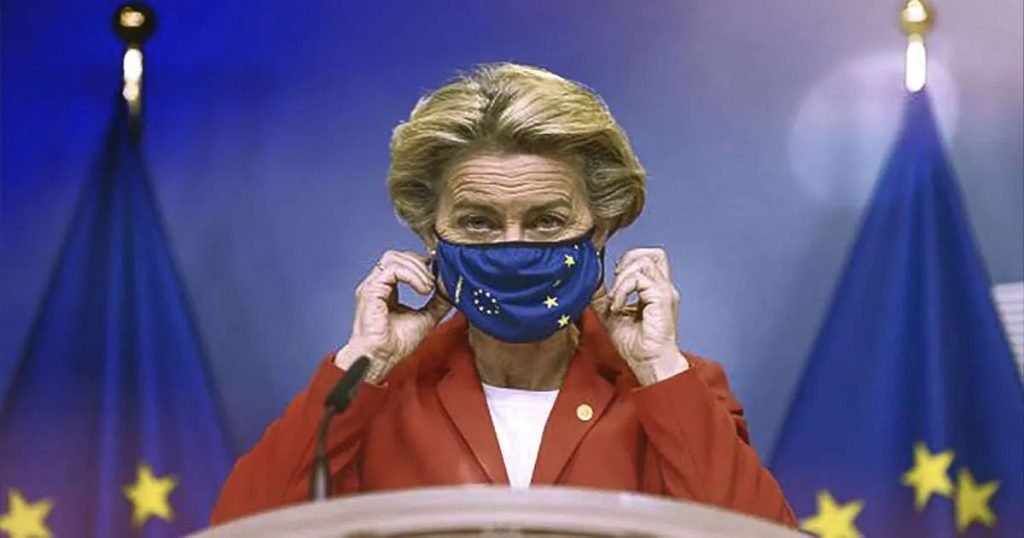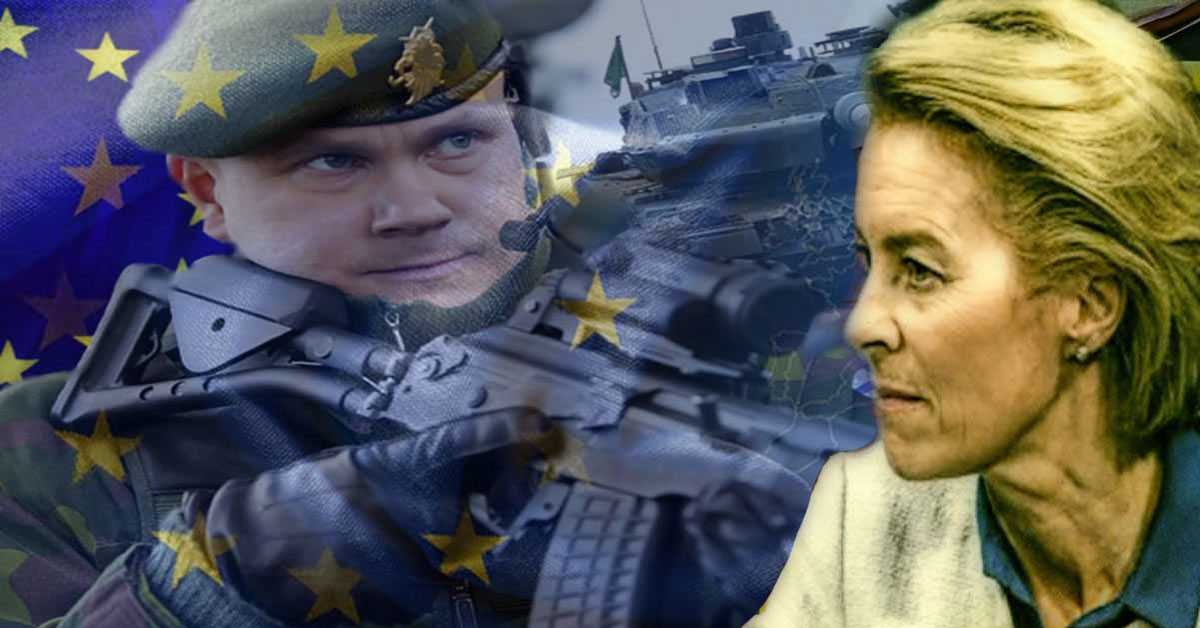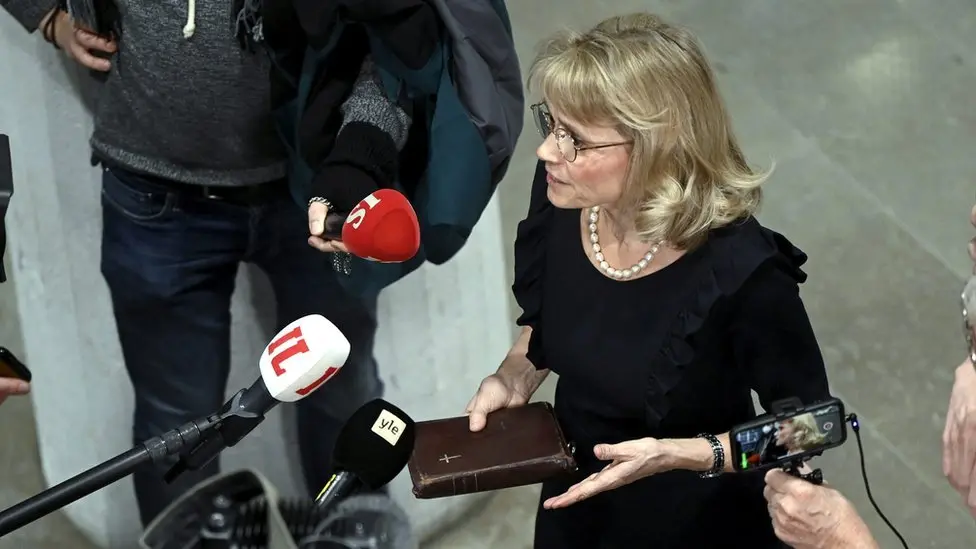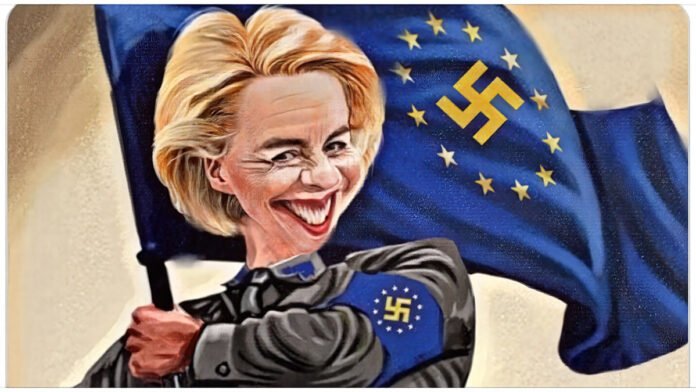Von der Leyen’s Pyrrhic Victory: How Brussels’ Elite Survived Another Scandal
When surviving a no-confidence vote becomes a victory, you know democracy is broken.
Ursula von der Leyen has survived a no-confidence vote, but the 360-175 margin tells a different story than Brussels wants to admit. This wasn’t a triumphant vindication of leadership. It was a showcase of everything rotten in the European project: unaccountable elites, corporate backroom deals, and the steady march toward militarised authoritarianism that serves capital above citizens.
Romanian MEP Gheorghe Piperea triggered the motion with hard evidence of institutional corruption, €21.5 billion in secretive vaccine contracts with Pfizer, negotiated through deleted text messages, with no transparency, no oversight, and certainly no public consent. These weren’t just accounting irregularities. They were acts of betrayal that exposed how EU democracy actually works: behind closed doors, for corporate benefit, with democratic accountability treated as an inconvenience.
The Pfizergate Cover-Up

The European Court of Justice’s General Court ruled in May 2025 that von der Leyen violated transparency laws by refusing to disclose text messages with Pfizer CEO Albert Bourla during massive COVID-19 vaccine negotiations. The Commission claimed these messages were “deleted because they were deemed to be of a ‘short-lived and ephemeral nature'” and contained no “important information relating to policies, activities and decisions.”
As the New York Times revealed, von der Leyen secured 1.8 billion vaccine doses through these private text exchanges, roughly four doses for every European. This echoed her pattern as German Defence Minister, where she “used her phone to award contracts worth several hundred million euros while acting as defence minister of Germany, effectively bypassing public procurement processes. She subsequently deleted all messages from her phone when investigators probed her.”
The European Court’s ruling was devastating: “has not given a plausible explanation to justify the non-possession” of the messages. Even the EU’s own Ombudsman “severely criticised the Commission” and confirmed a finding of “maladministration.”
But what consequences did von der Leyen face? None. She stonewalled, deleted evidence, and shrugged. Because accountability is for the little people, not for the self-appointed empress of the EU Commission.
Re-Arming Europe for Corporate Profit

Meanwhile, von der Leyen pushes her Orwellian “Re-Arm Europe” plan with messianic fervour. Speaking in March 2025, she declared: “We are in an era of re-armament. Europe is ready to massively boost its defence spending,” with plans that “could mobilise around 800 billion euros for defence.”
The plan involves member states increasing spending by 1.5% on average, potentially creating “around 650 billion euros in funding within four years” while activating the “national escape clause” of the stability and growth pact.
This is the EU’s true priority: €800 billion for bombs and bullets while member states struggle with austerity, inflation, and energy crises. Not about peace, not even about genuine defence, but about locking European nations into a dependency model where sovereignty is handed over to Brussels in return for militarisation that serves arms manufacturers above citizens.
The Authoritarian Drift

The creeping authoritarianism extends beyond military spending. Under von der Leyen’s Digital Services Act, EU officials and Big Tech platforms now decide what constitutes “misinformation.” Dissenting voices face algorithm suppression and content removal, with religious speech increasingly under attack.
The case of Finnish MP Päivi Räsänen illustrates this authoritarian drift. She faced criminal charges for tweeting Bible verses and questioning her church’s support for Pride events, with prosecutors arguing her statements were “likely to cause intolerance, contempt, and hatred towards homosexuals.” While she was ultimately acquitted by Finnish courts in both district court and appeal, with judges ruling “it is not for the district court to interpret biblical concepts”, the fact that such prosecution occurred at all reveals how fragile free speech has become across Europe.
Whether you agree with Räsänen’s views or not, the message is clear: expressing traditional religious beliefs and free speech now risks criminal prosecution across EU member states. The boundaries of acceptable speech are narrowing, with European institutions increasingly hostile to dissenting voices.
Democracy as Theatre

Reports suggest that had the no-confidence vote succeeded, von der Leyen’s entire Commission would have fallen. But MEPs were kept in line through the oldest game in European politics: power at any cost. Even Socialist MEPs who expressed concerns ultimately backed down after extracting promises about future budget negotiations.
Von der Leyen dismissed the motion as coming from “hard-right lawmakers” peddling “conspiracies,” claiming critics were trying to “rewrite history” about Europe’s pandemic response. This is how Brussels operates: legitimate questions about transparency and accountability get dismissed as extremism, while actual institutional corruption gets defended as competent governance.
The motion “failed to get the two-thirds majority it needed to pass” but represented “a political headache for von der Leyen as her Commission negotiates with US President Donald Trump’s administration to try to prevent steep US tariffs on EU goods.” Even survival becomes a liability when your authority is so compromised that basic institutional functions become impossible.
The Corporate-Financial Nexus

In August 2019, von der Leyen’s official mobile phones were wiped clean of all data during her transition from German Defense Minister to EU Commission President. The DispatchWikipedia The deletion occurred after the phones had been officially requested as evidence in a parliamentary investigation into the “Berateraffäre” (consultant scandal), where hundreds of millions of euros in contracts were awarded to firms like McKinsey without proper oversight. Tagesspiegel +5 Green Party MP Tobias Lindner filed criminal complaints for evidence destruction, arguing officials had “destroyed evidence” with “criminal implications.” Tagesspiegel +4
The defense ministry consultant scandal that started it all
The 2019 phone wiping occurred during Germany’s largest defence procurement scandal in decades. Von der Leyen’s Défense Ministry had spent €154.9 million on consultants in 2019 alone, making it the highest-spending ministry. The scandal centred on improper contract awards to McKinsey, KPMG, and Accenture, with accusations including circumventing procurement procedures and cronyism. taz.de +3
Key conflicts of interest emerged: State Secretary Katrin Suder, hired by von der Leyen in 2014, was a former McKinsey executive who maintained close ties to her former employer. Personal relationships between ministry officials and consultants included being godparents to each other’s children. Deutscher Bundestag Von der Leyen’s own son had worked at McKinsey, raising additional conflict concerns.
The parliamentary investigation committee had officially classified von der Leyen’s phones as evidence in February 2019. However, by August 2019, two phones had been wiped clean – one through “security deletion” by the manufacturer and another with all SMS messages deleted. The ministry initially claimed the phones couldn’t be found, then admitted they were in the ministry but only von der Leyen knew the PIN code, before finally revealing the data deletion. WEB.DE +2
Criminal complaints and legal responses from German politicians
Tobias Lindner of the Green Party filed the primary criminal complaint in December 2019, targeting “unnamed individuals” for suspected deliberate destruction of evidence under Section 274 of the German Criminal Code. Tagesspiegel +3 Lindner argued the deletion “thwarted the gathering of evidence” and “seriously damaged the aim of parliamentary clarification.” Tagesspiegel +3
The complaint highlighted suspicious timing: the deletion occurred after the parliamentary committee had demanded access to the phones and during von der Leyen’s departure from the ministry. Tagesspiegel A file destruction moratorium was already in place, making the deletion potentially criminal. Tagesspiegel +2
The Berlin State Prosecutor’s Office examined the case but ultimately did not file formal charges. The Defense Ministry claimed the deletion was due to “security reasons” following a January 2019 cyberattack that exposed politicians’ phone numbers. Tagesspiegel +2 However, critics noted this explanation didn’t account for the second phone’s deletion.
If you believe that I’ve got a bridge to sell you…
This isn’t democracy, it’s managed decline with a technocratic face. The corporate-financial elite are tightening their grip, using EU institutions as their enforcement arm. Von der Leyen isn’t a leader, she’s a figurehead for the Brussels cartel: Pfizer’s broker, NATO’s cheerleader, and Europe’s unelected empress.
An EU court has ruled that the European Commission violated transparency rules by failing to grant access to text messages between Ursula von der Leyen and the CEO of pharma giant Pfizer.
From dodgy contracts and deleted texts to militarisation and censorship, her Commission has made one thing brutally clear: the EU isn’t reforming, it’s hardening. Hardening into a fortress of capital where transparency is a joke, national sovereignty is expendable, and democratic accountability is treated as terrorism.
The pattern is unmistakable: use institutional power to serve corporate interests, criminalise opposition as extremism, then claim survival of no-confidence votes as vindication. As transparency advocates noted after the Pfizergate ruling: “public trust should be restored, there are open questions and it’s time for the Commission to show the commitment to upload public accountability.”
Instead, we get more militarisation, more censorship, and more contempt for the democratic principles the EU claims to defend.
The Reckoning Delayed
Europe is being re-armed, not for defence, but for profit. The same institutions that enabled €21.5 billion in secretive pharmaceutical contracts now demand €800 billion for military spending. The same officials who delete evidence of their dealings now prosecute citizens for expressing religious beliefs.
Von der Leyen “wasn’t present for the vote”, a perfect metaphor for her relationship with democratic accountability. Present for photo ops and corporate negotiations, absent when MEPs judge her record.
The 175 MEPs who voted for her removal represent millions of Europeans who understand what’s happening: the gradual transformation of the EU from a democratic project into a corporate enforcement mechanism. Their voices were outnumbered but not silenced.
Von der Leyen survived this vote, but the damage is done. Her authority is compromised, her credibility shot, and her Commission’s legitimacy hanging by the thread of partisan protection rather than democratic consent.
Like every empire that forgets the people it claims to represent, this one survives on borrowed time. The question isn’t whether the EU elite can continue rigging the game, it’s how long Europeans will tolerate being players in a match where the rules, the referees, and the outcome are all decided in corporate boardrooms.
The vote is over. The reckoning has just begun…
Support Independent Journalism Today
Our unwavering dedication is to provide you with unbiased news, diverse perspectives, and insightful opinions. We're on a mission to ensure that those in positions of power are held accountable for their actions, but we can't do it alone. Labour Heartlands is primarily funded by me, Paul Knaggs, and by the generous contributions of readers like you. Your donations keep us going and help us uphold the principles of independent journalism. Join us in our quest for truth, transparency, and accountability – donate today and be a part of our mission!
Like everyone else, we're facing challenges, and we need your help to stay online and continue providing crucial journalism. Every contribution, no matter how small, goes a long way in helping us thrive. By becoming one of our donors, you become a vital part of our mission to uncover the truth and uphold the values of democracy.
While we maintain our independence from political affiliations, we stand united against corruption, injustice, and the erosion of free speech, truth, and democracy. We believe in the power of accurate information in a democracy, and we consider facts non-negotiable.
Your support, no matter the amount, can make a significant impact. Together, we can make a difference and continue our journey toward a more informed and just society.
Thank you for supporting Labour Heartlands












